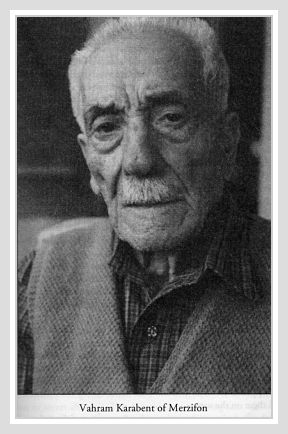 Vahram Karabent of Merzifon, was an Armenian citizen from the Ottoman Empire born in the city of Merzifon in 1905.
Vahram Karabent of Merzifon, was an Armenian citizen from the Ottoman Empire born in the city of Merzifon in 1905.
At the age of 10, Karabent witnessed the Ottoman Turkish deportation of the Armenians – four of his uncles, along with his Father and Grandfather were deported from their homes and never heard from again. Karabent along with his mother and brother, were the only members of his family to survive.
In addition to the suffering of the Armenian community, Karabent also witnessed similar measures taken by the Turks against the Greek community of Merzifon, and tells of the Greek resistance to the expulsions - below are excerpts from his story:
“At that time the Sultan was still the ruler.The Sultan issued an imperial decree saying, ‘Those who become Muslims will remain!’ Whether you were Armenian or Greek Orthodox, if you were willing to change your religion and become a Muslim, you would be saved. Those who refused to do so were rounded up and moved…. The government encouraged artisans and tradesmen who had necessary skills to adopt Islam and be saved. There were those who were saved in that way.”
”Excerpts from the book You Rejoice My Heart” by Kemal Yalcin, Printed by Gopsons Papers Ltd, Distributed by Garod books Ltd.
Permission has been obtained by Garod books to use and post excerpts from the true story of Vahram Karabent of Merzifon
ISBN 978-1-903656-72-3
“The calamity didn’t spare the Greeks, either…Even as they were saying that things would be getting back to normal, the war began again.This time they began to attack the Greeks and subject them to things similar to what had been done to us. Ultimately, the calamity that had befallen us also befell the Greeks some five years later.
Here, take a look at the scar on my arm! Do you know where and how I received this wound? I’ll tell you!
The year was 1920. I was fifteen years old. The calamity that had come upon the Armenians had passed, they said, but now Topal Osman’s gangs of brigands made their appearance in the regions around the Black Sea.They struck against the Greeks and murdered them.
I remember it exactly how it happened. It was a Saturday. The Topal Osman gang came to Merzifon with the intention of carrying out a raid against the Greeks. But there weren’t that many Greeks left in Merzifon. And those who were there weren’t rich.
During that time they started to deport the Greeks. After the raids and attacks by Topal Osman’s gangs, the Greeks who lived in the area began to disappear.
The expulsion of the Greeks wasn’t exactly like the Armenian Deportation, but still, expulsion is expulsion. May no one ever have to go through it! We couldn’t do a thing to help the Greeks. We had no means with which to do anything for them. And we were scared. We were hopeless and alone. It was like the whole world was against us.
There were a lot of Greeks in the region of Amasya, in Samsun and on the Black Sea coast. And the Greeks didn’t submit meekly like the Armenians had. They also formed armed bands. They armed themselves and fled to the mountains. They defended themselves up there.If they hadn’t taken up arms to defend themselves, not a single one of them would have survived. It wasn’t like in 1915. The Greeks were strong. They fought.
Some of the Greeks died, others were killed. Those who had caiques or boats fled to Russia. Others fled to Greece or were sent there.
But the enormity of the disaster that befell the Armenians can’t be compared to that of the Greeks. Only a very few of the Armenians managed to survive… no more than one or two from any family or line. But those things that happened to the Greeks can still be seen as comparable in some ways to the calamity that befell the Armenians. During their dark days, most Greek families or lines lost one or two members.”